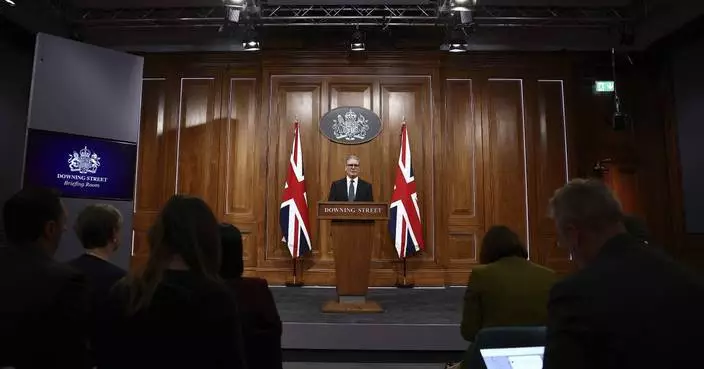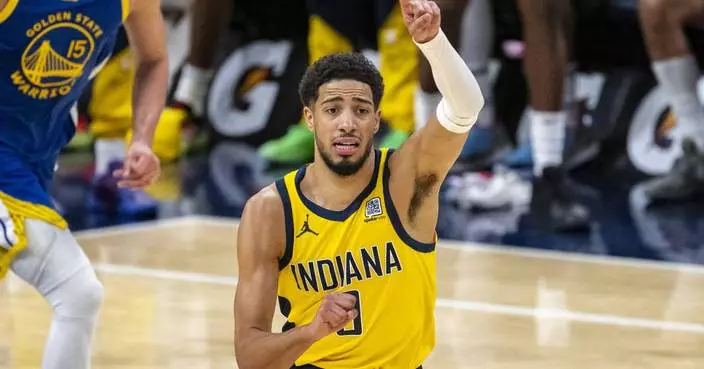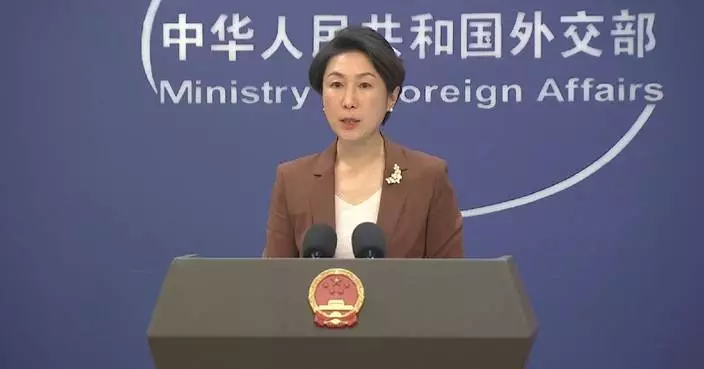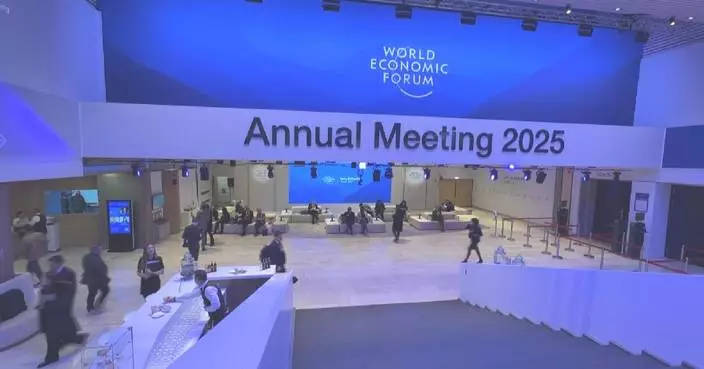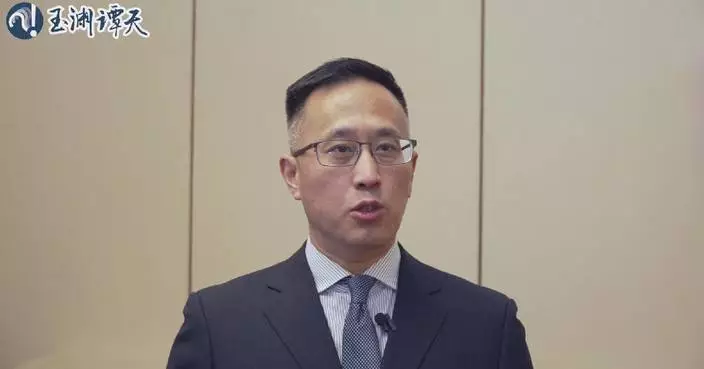NORMAN, Okla. (AP) — A pair of five-star quarterbacks from the 2023 class will face off when Tennessee’s Nico Iamaleava and Oklahoma’s Jackson Arnold lead their teams on Saturday night.
Iamaleava was ranked No. 1 in the On3 quarterback rankings and No. 2 in the 247Sports quarterback rankings. Arnold was the 2022-23 Gatorade National Player of the Year. He was the Elite 11 MVP, and ESPN ranked him the No. 1 quarterback in his class.
Both will be in the spotlight against stout defenses when No. 6 Tennessee (3-0) visits No. 15 Oklahoma (3-0) in the first career Southeastern Conference game for both players and the league opener for both teams.
Iamaleava is 4-0 to start his career, including a win over a ranked Iowa squad in the Citrus Bowl last season in his first start. This season, he led the Vols to a blowout victory over another ranked team, N.C. State, in the Duke’s Mayo Classic in Charlotte.
Tennessee center Cooper Mays can’t wait to see how his quarterback handles his first true road game.
“He’s super consistent in who he is day in and day out,” Mays said. “He’s laid back and calm, cool, and collected. That’s him every day, no matter the environment. Super excited to protect him and help him do all of the things he wants to do on Saturday.”
Iamaleava has been so effective in Heupel’s offense that he’s played only eight quarters so far this season with Tennessee blowing out opponents 191-13 to start this season. That’s why Iamaleava has thrown for a mere 698 yards with six TDs and two interceptions, averaging 232.7 yards per game.
“He’s fun to watch,” Oklahoma coach Brent Venables said. “He’s incredibly talented, strong arm, great runner. The things he’s been able to do in a short amount of time. He’s completed 72% of his passes and he’s just been fantastic. He’s got a great presence to him, he’s got a great supporting cast and a great defense."
Iamaleava is a freshman because he didn’t play enough games last season to lose any eligibility. This season, he became the first freshman quarterback to start an opener for Tennessee since 2004.
Arnold is a sophomore because he played in seven games last season. Like Iamaleava, Arnold got his first start in a bowl game last season. He passed for 361 yards and two touchdowns with three interceptions in a loss to Arizona in the Alamo Bowl.
Arnold has passed for 484 yards and seven touchdowns this season and rushed for 159 yards and two more scores in three games. He has had big moments this season — he threw four touchdown passes in the season opener against Temple and ran for 97 yards and two touchdowns in a win over Tulane.
He struggled to get the team moving in a 16-12 win over Houston in Week 2, prompting some concern. He then threw an interception against Tulane that was returned for a touchdown that pulled the Green Wave to within 24-19 before Oklahoma pulled away for a 34-19 win.
“You throw the ball away or just run the ball,” Venables said. “I loved how he responded. Did a great job obviously in the fourth quarter. We scored 10 points, he does a great job of … doing a lot of things right, putting it behind him, learning from it. There’s growth in that. That’s how you get better.”
Tennessee coach Josh Heupel said Arnold has several good qualities that concern him.
“In general, he takes great care of the football,” Heupel said. “I think he has great command and presence in what they are doing offensively. He has the ability to use his feet to make things right. That can be when the pocket breaks down, designed quarterback run or read game. He is a really talented young player.”
AP Sports Writer Teresa M. Walker in Nashville, Tenn., contributed to this report.
Get poll alerts and updates on the AP Top 25 throughout the season. Sign up here. AP college football: https://apnews.com/hub/ap-top-25-college-football-poll and https://apnews.com/hub/college-football
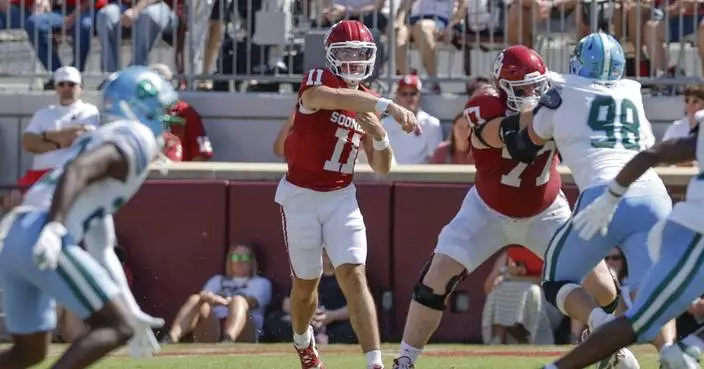
Tennessee's Iamaleava, Oklahoma's Arnold to meet in battle of top 2023 QB recruits
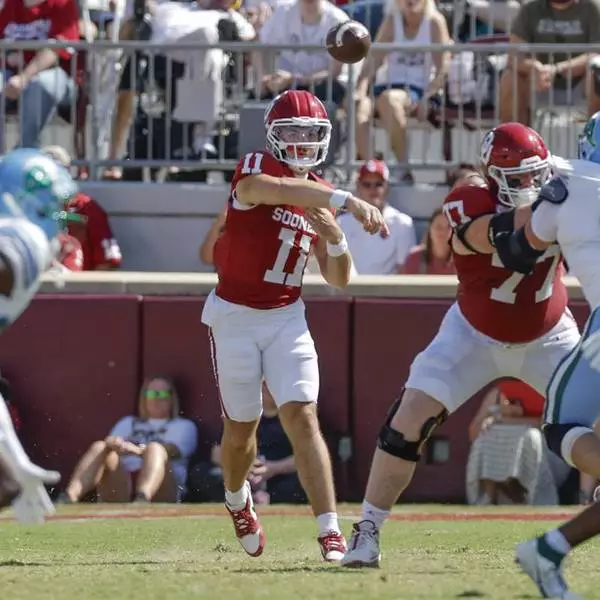
Tennessee's Iamaleava, Oklahoma's Arnold to meet in battle of top 2023 QB recruits
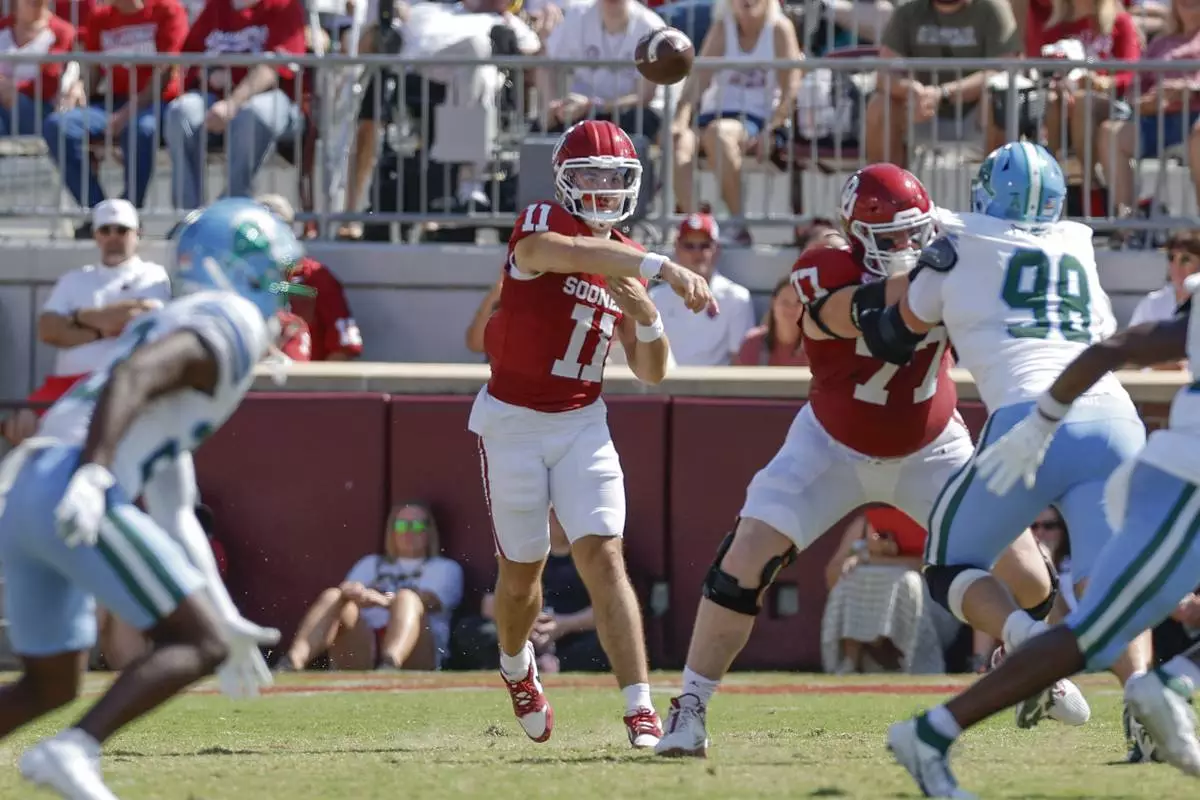
Oklahoma quarterback Jackson Arnold (11) passes against Tulane during the first quarter of an NCAA college football game Saturday, Sept. 14, 2024, in Norman, Okla. (AP Photo/Alonzo Adams)
WASHINGTON (AP) — U.S. President Donald Trump used one of the flurry of executive actions that he issued on his first day back in the White House to begin the process of withdrawing the U.S. from the World Health Organization for the second time in less than five years — a move many scientists fear could roll back decadeslong gains made in fighting infectious diseases like AIDS, malaria and tuberculosis.
Experts have also cautioned that withdrawing from the organization could weaken the world’s defenses against dangerous new outbreaks capable of triggering pandemics.
Here’s a look at what Trump’s decision means:
During the first Oval Office appearance of his second term, Trump signed an executive order detailing how the withdrawal process might begin.
“Ooh," Trump exclaimed as he was handed the action to sign. "That’s a big one!”
His move calls for pausing the future transfer of U.S. government funds to the organization, recalling and reassigning federal personnel and contractors working with WHO and calls on officials to “identify credible and transparent United States and international partners to assume necessary activities previously undertaken by” WHO.
This isn’t the first time Trump has tried to sever ties with WHO. In July 2020, several months after WHO declared COVID-19 to be a pandemic and as cases surged globally, Trump’s administration officially notified U.N. Secretary-General Antonio Guterres that the U.S. was planning to pull out of WHO, suspending funding to the agency.
President Joe Biden reversed Trump’s decision on his first day in office in January 2021 — only to have Trump essentially revive it on his first day back at the White House.
It is the U.N.’s specialized health agency and is mandated to coordinate the world’s response to global health threats, including outbreaks of mpox, Ebola and polio. It also provides technical assistance to poorer countries, helps distribute scarce vaccines, supplies and treatments and sets guidelines for hundreds of health conditions, including mental health and cancer.
“A U.S. withdrawal from WHO would make the world far less healthy and safe,” said Lawrence Gostin, director of the WHO Collaborating Center on Global Health Law at Georgetown University. He said in an email that losing American resources would devastate WHO's global surveillance and epidemic response efforts.
Dr. Tom Frieden, a former director of the U.S. Centers for Disease Control and Prevention, said Trump's move "surrenders our role as a global health leader and silences America’s voice in critical decisions affecting global health security.”
“We cannot make WHO more effective by walking away from it,” Frieden said in a statement. “This decision weakens America’s influence and increases the risk of a deadly pandemic.”
Yes, as long as he gets the approval of Congress and the U.S. meets its financial obligations to WHO for the current fiscal year. The U.S. joined WHO via a 1948 joint resolution passed by both chambers of Congress, which has subsequently been supported by all administrations. The resolution requires the U.S. to provide a one-year notice period should it decide to leave WHO.
It’s extremely bad. The U.S. has historically been among WHO’s biggest donors, providing the U.N. health agency not only with hundreds of millions of dollars, but also hundreds of staffers with specialized public health expertise.
In the last decade, the U.S. has given WHO about $160 million to $815 million every year. WHO’s yearly budget is about $2 billion to $3 billion. Losing U.S. funding could cripple numerous global health initiatives, including the effort to eradicate polio, maternal and child health programs, and research to identify new viral threats.
American agencies that work with WHO would also suffer, including the CDC. Leaving WHO would exclude the U.S. from WHO-coordinated initiatives, like determining the yearly composition of flu vaccines and quick access to critical genetic databases run by WHO, which could stall attempts to produce immunizations and medicines.
At a September campaign rally, Trump said he would “take on the corruption” at WHO and other public health institutions that he said were “dominated” by corporate power and China.
His executive order Monday said the U.S. was withdrawing from WHO “due to the organization’s mishandling of the COVID-19 pandemic that arose out of Wuhan, China and other global health crises” and cited the agency’s “failure to adopt urgently needed reforms” and its “inability to demonstrate independence from the inappropriate political influence of WHO member states.”
WHO made several costly mistakes during the pandemic, including advising people against wearing masks and asserting that COVID-19 was not airborne. The agency only officially acknowledged last year that the virus is indeed spread in the air.
During its efforts to stop COVID-19, WHO also dealt with the biggest sexual abuse scandal i n its history, when media reports revealed that dozens of Congolese women had been sexually harassed or assaulted by health responders working to contain Ebola. The AP found senior managers were informed of some instances of sexual abuse when they occurred in 2019 but did little to stop them or punish perpetrators.
In a statement Tuesday, WHO said it “regrets” Trump's announcement.
“We hope the United States will reconsider and we look forward to engaging in constructive dialogue to maintain the partnership between the USA and WHO,” the organization said.
“For over seven decades, WHO and the USA have saved countless lives and protected Americans and all people from health threats. Together, we ended smallpox, and together we have brought polio to the brink of eradication,” WHO said.
At a Geneva news briefing on Tuesday, WHO spokesperson Tarik Jasarevic said the U.S. contributed 18% of WHO's budget in 2023, making it the single biggest donor that year. He declined to say what the U.S. withdrawal might mean for WHO.
Cheng reported from Toronto. Geir Moulson in Berlin contributed to this report.
The Associated Press Health and Science Department receives support from the Howard Hughes Medical Institute’s Science and Educational Media Group and the Robert Wood Johnson Foundation. The AP is solely responsible for all content.
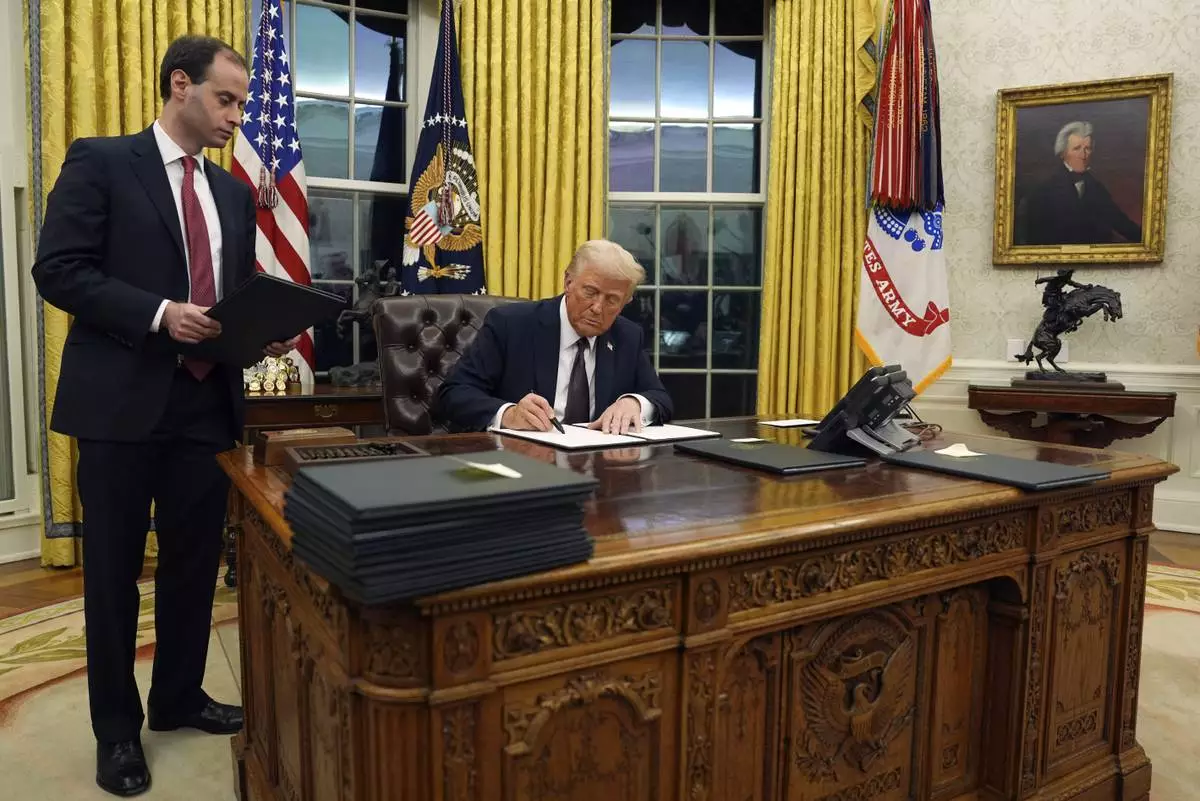
President Donald Trump signs an executive order withdrawing the U.S. from the World Health Organization in the Oval Office of the White House, Monday, Jan. 20, 2025, in Washington. (AP Photo/Evan Vucci)







